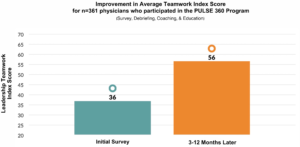Good Physicians, Bad Behavior: Can They (really) Change?
The pandemic has increased stress and cortisol levels for the entire planet, and these negative variables may have amplified a few negative behaviors of some of your best and brightest physicians and providers.
Furthermore, everyone around these physicians is more on edge too, and this can create a fertile breeding ground for teamwork conflicts. Being short-staffed can lead to short tempers! Physician and nurse leaders across the US and Canada have been telling us that abrasive and bullying behaviors have been on the rise, and we all know how these negative behaviors can lead to compromised quality, as well as endless headaches for these healthcare leaders.
So, the question is: Can you actually change a physician’s behavior with the goal of putting a tourniquet around the flow of complaints? The short answer is yes ... and here’s a summary of the tools that worked (from the peer-reviewed journal, Surgery).
The University at Buffalo’s Jacobs School of Medicine and Biomedical Sciences — along with two of PULSE’s PhDs — co-authored an article in the journal Surgery that followed more than 1000 physicians across various specialties. Entitled “How Physicians Change: Multisource Feedback-Driven Intervention Improves Physician Leadership and Teamwork,” it concluded that physicians receiving PULSE 360 feedback and the standard “Tier 3” intensive program interventions (such as individualized PULSE telephone coaching, goal-setting, and online educational modules) had a 53% leadership-teamwork index score improvement. The Teamwork Index score refers to the overall performance a physician receives on survey results, and the PULSE 360 survey includes benchmarked questions for motivating behaviors and discouraging behaviors. Those who started with the lowest PULSE scores had the greatest statistical improvement, with P-values approaching 0.

What were the “Tier 3” interventions? According to the study, physicians received a PULSE-coach telephone debriefing, set excellence goals and received automated reminders, participated in tele-coaching, watched selected PULSE online educational videos, and focused on how the tools and techniques presented in the educational videos could be applied to the Physician’s specific work environment and challenges.
The conclusions? The 360 feedback scores significantly improved based on the above interventions and, in particular, physicians who start with low scores have the greatest potential for leadership and teamwork improvement.
So, with the right approaches, the answer is: Yes! Bad behavior in good physicians can improve.
